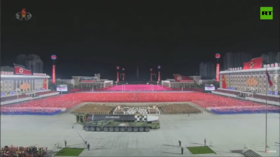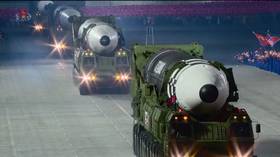Kim Jong-un’s massive new ballistic missile is final proof that Trump’s confused approach to North Korea has failed

At the start of his presidency, Donald Trump pledged North Korea would never develop a nuclear weapon that could reach the US. But despite his efforts, the Koreans have no intention of ‘denuclearizing’.
Over the weekend, North Korea celebrated the 75th anniversary of the Workers’ Party of Korea, the country’s ruling party.
To mark the occasion a vast military parade was held before dawn in the heart of Pyongyang, which was accompanied by an emotional speech from leader Kim Jong-un who focused on the country’s struggle against Covid-19.
The event’s real scene stealer, though, was the revealing of a new intercontinental ballistic missile which exceeded the size of the country’s established arsenal. The US State Department issued a statement saying it was “disappointed” at the development and called upon Pyongyang to commit to “complete denuclearization.”
But herein lies the problem: Where have we heard “complete denuclearization” before? It’s been American policy for a number of years now. In January 2017, just a couple of weeks before his inauguration, Trump famously tweeted “North Korea just stated that it is in the final stages of developing a nuclear weapon capable of reaching parts of the U.S. It won't happen!”, commencing the opening of a strategy known as ‘maximum pressure’ whereby Washington set out to push Pyongyang to relinquish its nuclear arsenal by force, which would include more sanctions and threats of war.
North Korea just stated that it is in the final stages of developing a nuclear weapon capable of reaching parts of the U.S. It won't happen!
— Donald J. Trump (@realDonaldTrump) January 2, 2017
Almost four years later, this is the end result. Nothing has changed apart from the advancement of North Korea’s capabilities.
Trump’s strategy has been chaotic, ranging from threatening to “totally destroy” North Korea to meeting Kim Jong-un himself on three occasions. Yet despite all of it, he failed to clinch a deal.
The decision to talk with North Korea might deserve plaudits for its optimism and helping to avoid war, yet ultimately Trump’s goals fell short, because – derailed by hawks within Washington – they were based on a premise that was always a non-starter for the country’s leadership. Simply, North Korea will never relinquish its nuclear weapons, as they are seen as the ultimate means for the state’s survival. It would be tantamount to suicide for the Koreans.
North Korea’s official ideology, Juche, is a philosophy of political resolve. It places the independence and sovereignty of the state as the ultimate goal, and argues that the DPRK must prevent itself from being dominated at whatever cost, and instead utilize the force of human will to struggle against its circumstances to achieve things on its own political terms.
It is a strategy of extreme realpolitik, which is prepared to endure costs at the population’s expense, such as sanctions, in order to sustain its position and prevent itself from being subjugated by great powers such as the US and even China. This is the preliminary logic that underpins the country’s nuclear weapons programme, which is seen as a golden guarantee for national sovereignty and political leverage.
As a result, while Pyongyang is willing to negotiate with the US, it has and has never had any intention to surrender its nuclear programme in its entirety. It is only willing to accept a deal on its terms, which involves the US pragmatically accepting its nuclear status.
The leadership is aware it cannot trust Washington, so despite pressure it has continued to enhance its capabilities to strengthen its hand and refused to heed to American calls for “complete denuclearization.”
This is what the Washington hawks do not seem to understand. In their perspective, reaching a ‘halfway’ agreement with Pyongyang is tantamount to defeat for American strategic interests, so they have pushed Trump to try for a ‘zero-sum’ outcome wherein only a full dismantling of North Korea’s programme is acceptable.
This position destroyed Trump’s diplomacy. The infamous Hanoi summit of early 2019 saw ultra-hawk John Bolton sabotage a potential agreement and influence Trump to walk out of a meeting.
Despite a photo-op ‘mini summit’ in Panmunjom later that year, serious talks between the US and North Korea have not resumed. Kim responded to Hanoi by testing 20 short-range missiles that year, just enough to keep developing capabilities while not crossing the line to provoke tougher sanctions.
The Trump administration didn’t respond by returning to more pressure; instead it just gave up on the North Korea issue as its foreign policy priority shifted to China and Iran. Now that the White House has turned Beijing into an enemy and strategic rival, hopes of getting China to cooperate in future have also been diminished.
Also on rt.com BBC mistakes Taiwan’s National Day celebrations for North Korean military parade (VIDEO)Given this, Trump’s North Korea policy as a whole simply stagnated. The display of new intercontinental ballistic missiles by Pyongyang right toward the potential end of his presidency is no coincidence. It is a firm sign of determination by Kim Jong-un that his negotiating position hasn’t changed, and will not change.
Trump’s pledge in 2017 ultimately failed. While there is an argument that the use of ‘unconventional methods’ may have got closer to a definitive outcome than other presidents have achieved and also made historic firsts, the fixation on the zero-sum outcome of “complete denuclearization” underpinned by Washington war-hawks refused to confront the realities of North Korea’s position.
Trump now faces the prospect of either having to leave office or trying again against a Kim Jong-un with an even bigger hand than before.
Think your friends would be interested? Share this story!
The statements, views and opinions expressed in this column are solely those of the author and do not necessarily represent those of RT.













